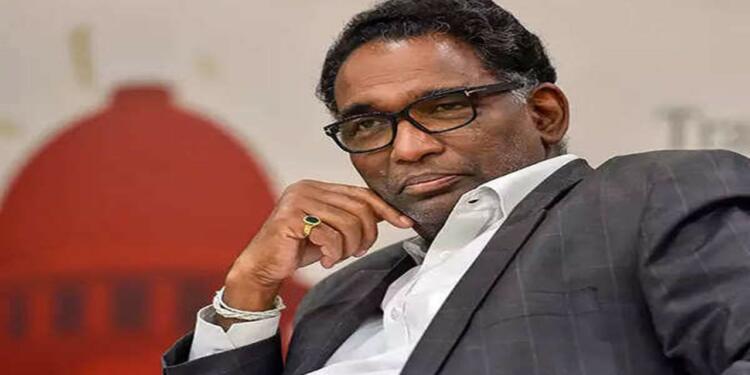Justice Chelameswar: How the judges would and should be appointed has been a point of contention for decades in India. India, as we all know, is a participatory democracy and therefore provides a clear bifurcation between the judiciary and legislature. This has been done to facilitate checks and balances in the country. But the reality is just the opposite. The two most powerful and crucial arms of democracy, the legislature and judiciary, have been at loggerheads with each other, the prominent issue being the appointment of judges. Now, another loophole in the justice delivery system has been pointed out, not by anyone else but an insider.
Justice Chelameswar comes crashing down on the current system
Former Supreme Court Justice Jasti Chelameswar, the one more famously known for dissenting in the NJAC judgement, has come crashing down on the judiciary. He called out the judges for being lazy and said that some judges take years to write judgements. He also attacked the Collegium system as well. He highlighted that despite allegations being levelled against those judges, the collegium often doesn’t take any action against them, mentioning the existing loopholes in the collegium system.
When he said all this, Justice Chelameswar was speaking on ‘Is Collegium Alien to the Constitution?’ at a seminar at Kochi’s Kerala HC auditorium, organised by the Kerala High Court unit of the Bharatheeya Abhibhashaka Parishad.
Justice Chelameswar addresses the elephant in the room
Justice Chelemeswar openly said that judges are lazy and the collegium, which has entrusted itself with the responsibility of managing the affairs, does nothing about that. He said, “Some allegations may come before the collegium, but nothing is usually done. If the allegations are serious, maybe action should be taken. The general solution is to just transfer judges… Some judges are just lazy and take years and years to write judgements. Some judges are inefficient.’ While saying all this, he also highlighted the probability of getting trolled and said that, “Now if I say anything, I will get trolled tomorrow, saying why is he saying all this after he retired, but that is my fate. But recently, SC remanded two judgements from an HC because it could not understand what its judgements said.”
Chelameswar spoke for the last man standing
While ending his address, he dedicated his time and words to the last man standing in the busy corridors of the court and waiting years for justice. He said, “Nobody is talking about the common man waiting for years in the corridors of the court or how to improve the system. This is something that needs our attention. For the sake of your children, make the right decisions. That’s all I have to say.”
It is often said that ‘Justice delayed is Justice denied’, However, no matter how much the process is expedited, there has been no case where justice has been delivered within time. Why does he say that? It’s because reports say that over 4.4 crore cases are pending all over India. Is it not a sign of danger for the legal justice system? Seeing this record can break a person’s belief in the Indian judiciary because whenever a crime occurs, a court is believed to stand for the justice of the victim, but on the contrary, the court takes 7 to 28 years to announce its judgement. Also, the value of time is respected in the profession, but the delayed judgements completely show that there is no importance to time in court judgements. The most prominent examples of the same can be the delayed justice in the Nirbhaya case, which was a 3-judge bench judgement headed by Justice R Bahumathi and other judges Justice Bhushan and Justice A S Bopanna, where all 4 men were convicted for the 2012 Nirbhaya gang-rape case and murder case and were finally hanged 7 years after a brutal crime. Not to mention, the Babri Masjid demolition case took 28 years to finally state what was right and what were the false accusations and brandings on the Kar Sevak.
Justice Chelameswar talks about NJAC
Justice Chelameswar also emphasised the independence of the judiciary during his address and said that an independent judiciary is an essential element for the survival of democracy. His speech suggested that his dissenting judgement in the NJAC case was probably read differently, as he said that he never suggested the handing over of the selection of judges to the executive. He said that he knows the dangers of handing over the power of appointing judges to the executive.
Justice Chelameswar pointed out that only if the collegium has not been mentioned in the constitution, that doesn’t mean that the collegium system is illegal. In this regard, he said, “A very eminent personality recently said that the text of the constitution does not contain the word collegium and therefore it is illegal. My friends, who are all lawyers, does the Constitution contain anything which says freedom of press? If we accept this kind of logic or argument, a lot of things, including freedom of press, can go.”
However, he also spoke against the Collegium system, highlighting the loopholes and demanding reforms. He was the first person to highlight that nothing was recorded in the collegium meeting, thus highlighting a lack of transparency. He asked to keep in record why the collegium rejects, accepts or transfers a judge.
What does this suggest? The same thing that we have been telling people for years, the judiciary needs reforms, and now the voice is coming from inside the system too. Further, India needs to do away with the Collegium system.
Support TFI:
Support us to strengthen the ‘Right’ ideology of cultural nationalism by purchasing the best quality garments from TFI-STORE.COM
Also Watch:

























